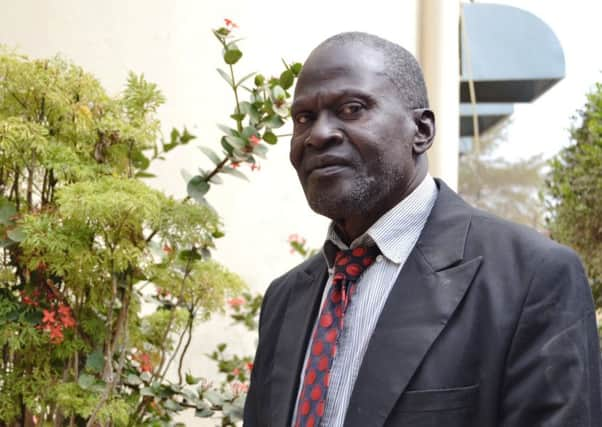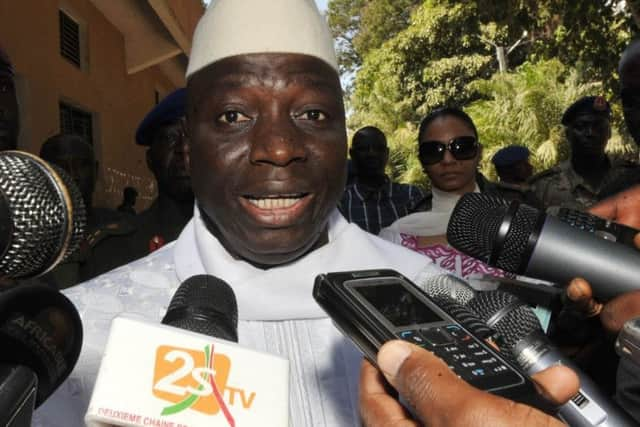How I fell victim to the Gambian president who claimed to be able to cure AIDS


Even by his own bizarre standards of behaviour, Yaha Jammeh’s claims that he could cure AIDS were pretty out there. While some of the finest brains in science had spent years honing the anti-retroviral drugs which had removed the automatic death sentence the disease once brought, in 2007 the then president of Gambia unveiled a more homespun approach.
His treatment, which without a hint of embarrassment he announced to the world would only work on Mondays and Thursdays, involved rubbing a herbal paste into the rib cage of each patient, who afterwards was made to swallow a bitter, yellow drink made from secret ingredients.
Advertisement
Hide AdAdvertisement
Hide Ad“Whatever you do there are bound to be sceptics,” he told the Press that year as he stood in his presidential compound surrounded by bodyguards. “But I can tell you my method is foolproof. Mine is not an argument, mine is a proof. It’s a declaration. I can cure AIDS and I will.”


World health experts were appalled and while Jammeh pushed on with his programme it soon became clear that he hadn’t stumbled across some ancient remedy and his herbal paste didn’t have magical healing powers. In fact, many of those who entered the president’s bogus treatment rooms quickly fell ill and an unknown number subsequently died.
One of those who fell victim to Jammeh’s quackery was Leeds University graduate Ousman Sowe. Back in 2007, he was head of a Gambian AIDS support network and like many he admits he felt he had no other option but to sign up to the president’s whim.
“When I first heard him say that he had found a cure, we were all taken aback” says Sowe, who studied public health in Yorkshire during the 1990s. “AIDS had already taken so many lives. We had lost friends and loved ones and we all wanted to believe that somewhere a cure existed. I knew as an educated man that we had to put our faith in conventional medicine, but Jammeh wasn’t someone you could easily say no to.”
Advertisement
Hide AdAdvertisement
Hide AdThe first case of HIV in the Gambia was diagnosed in 1986 and in a country where public health education has been historically rudimentary it quickly became an epidemic. In those early days, many relied on the treatment prescribed by local witch doctors and even 10 years ago, when international agencies were trying to debunk many of the myths and misconceptions surrounding the disease, suspicion was rife.


“Jammeh wanted people with AIDS to try out his cure,” adds Sowe. “I thought that as both a sufferer and head of an organisation that had been set up to support others in the same position, if anyone should go, it should be me.
“I remember the day I arrived at the presidential compound. I don’t think I was alone in having doubts, but among those gathered you could tell that whatever reservations there were they were outweighed by the hope that all of us there were going to take some wonderful medicine and be cured.”
It wasn’t long before that optimism was overtaken by doubts and fears and once inside the compound it became clear they couldn’t leave. Prevented from contacting their families, all had to abide by a strict set of rules, which included no smoking, no caffeine and no sex.
Advertisement
Hide AdAdvertisement
Hide AdWorse still, all those who signed up to Jammeh’s AIDS programme were made to stop taking the conventional drugs they had been prescribed and as they sipped the herbal concoctions he had dreamed up, many, including Sowe, began to fall ill.
“We didn’t know what we were being given, but once we were there we were trapped,” says Sowe. “The treatment programme lasted six or seven months, but many didn’t make it to the end. We lost weight, we became weak but no one felt able to voice their concerns. We were in the President’s world and we couldn’t escape.
“It has been very difficult for all of us who became involved in his treatment. We were made to go on state television and say how fantastic Jammeh was and how amazing the treatment. I could barely walk by the time I was put in front of a film crew, but I knew what I had to do. We didn’t feel like we had any choice. He was the president, we couldn’t say no.”
Now 64 years old, Sowe is finally speaking out about his experience in the hope that Jammeh, whose 22 year rule of Gambian came to an end last year, can be brought to justice. He insists he doesn’t feel bitter, but given the bogus treatment was administered not in secret, but with the full knowledge of the international community, it his now hard to comprehend just how he got away with it.
Advertisement
Hide AdAdvertisement
Hide AdHowever, the supposed cure for AIDS was just one of a succession of bleak chapters in Jammeh’s rule of Gambia. While he banned female genital mutilation, labelling the practice as having “no place in Islam or in modern society” and outlawed child marriages, his reign was for from progressive.
Claiming to have supernatural powers, he reportedly carried out exorcisms on those he suspected of practising witchcraft against the government, forcing them to drink hallucinogenic potions to elicit confessions. The same year he announced his cure for AIDS, he also threatened to introduce legislation against homosexuality that would be “stricter than those in Iran”.
Having lost the 2016 election, Jammeh iron grip on the country finally loosened, but while he may be gone, those like Sowe are determined that his human rights violations are not forgotten.
“We have to speak out,” he says. “There is an issue of compensation, but more than that if we tell our story then hopefully it may prevent another scandal like this from happening again.”
Advertisement
Hide AdAdvertisement
Hide AdWhile compared to some other African countries the infection rate in Gambia of two percent is relatively low, but last year figures showed that only 30 per cent of those diagnosed were on ARVs and it seems unlikely it will hit the 90 per cent target by 2020.
It is estimated that 9,000 Gambians signed up to Jammeh’s bogus programme and while some like Sowe, who is now working with the US-based charity Aids free World to draw attention to the scandal, survived, many didn’t.
“Jammeh fled to Equatorial Guinea and it is not going to be easy to get him to trail but we have to try,” says Reed Brody, a US lawyer who has previously represented victims of Chilean dictator General Augusto Pinochet and former Chadian despot, Hissène Habré. “The country is deep in political transformation and the priority has to be reform of the judiciary, so that a fair trial can take place.
“However, as the victims tell their stories and more and more information comes out the demand for justice could become overwhelming.”